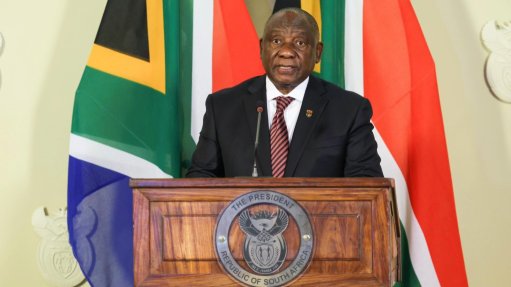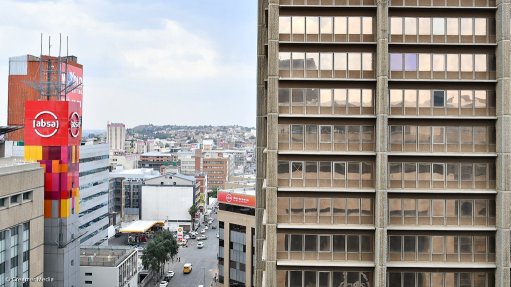Bank invests in oil, gas projects as part of mobilisation targets


BOITUMELO SETHLAWSWE Standard Bank's revised targets emphasise the group's commitment in leading energy and infrastructure development on the continent
Not only does financial services provider Standard Bank prioritise renewable energy as part of its sustainable finance mobilisation targets, it also supports a broader range of activities that contribute to the decarbonisation of Africa’s economies.
As such, the bank continues to finance new oil and gas projects, provided they are designed and implemented with robust environmental and social risk controls.
This balanced approach includes limiting upstream oil and gas exposure to less than 30% of the energy portfolio and less than 3% of the bank’s total loans and advances, with a goal of reducing the physical intensity of the portfolio by 10% by 2030.
Standard Bank, a leader in Africa’s energy and infrastructure development, announced the changes to its sustainable finance mobilisation targets – which are aimed at maximising positive impact and supporting the decarbonisation of Africa’s economies – earlier this month.
The revised targets emphasise Standard Bank’s commitment to leading energy and infrastructure development on the continent.
In 2022, the financial institution set a target to mobilise R250-billion in sustainable finance by 2026.
“As part of the process of updating our group climate policy and improved integration of sustainable finance across the group, we have identified additional eligible assets in our portfolio and have updated our group sustainable finance targets,” says Standard Bank Group sustainability head Boitumelo Sethlatswe.
Building on this foundation, the bank has now updated its group sustainable finance targets, aiming to mobilise over R450-billion by 2028.
“This ambitious goal builds on the R177-billion already financed since 2022, with R50.6-billion mobilised in 2023 and R74.3-billion in 2024.
Sethlatswe says that Standard Bank remains steadfast in its commitment to achieving net-zero financed emissions by 2050.
“This involves engaging with clients on sector transition pathways and advocating for supportive policy and regulatory frameworks.”
No Standard Goals
Standard Bank states that its purpose is to drive Africa’s growth by ensuring that its business activities address the continent’s challenges and deliver improved prosperity for its people.
The bank is reportedly dedicated to conducting its core business in a manner that generates positive social, economic and environmental impacts for the communities it serves.
Further, the bank’s activities focus on four key areas: financial health and inclusion; business growth and job creation; climate change mitigation and adaptation; and infrastructure development.
Investment in renewable-energy infrastructure remains a priority for Standard Bank, and it focuses on expanding access to affordable and reliable energy, particularly through renewable-energy solutions.
This includes financing utility-scale and decentralised renewable-energy projects, as well as energy efficiency solutions for small and medium-sized enterprises and homeowners.
In 2022, Standard Bank set a target to mobilise R50-billion in finance and R15-billion in underwriting for new renewable-energy projects by 2024, achieving 82% of this target by raising R53.4-billion.
In 2024, the bank’s energy supply ratio, being the share of finance directed towards renewable-power generation relative to that for non-renewable power generation, was 5.96 times.
Sethlatswe says the bank’s approach to sustainability is deeply rooted in its purpose: “Africa is our home; we drive her growth.”
Further, “our commitments reflect our ambition to be a leading green energy player on the continent”.
Standard Bank recognises the critical role it plays in supporting African economies to achieve a just energy transition, ensuring access to affordable energy while managing climate risk and advancing towards a low-carbon future.
Standard Bank’s strategy is guided by the Paris Agreement’s principle of ‘common but differentiated responsibilities’, acknowledging that climate actions must vary based on national circumstances.
Sethlatswe concludes that this perspective shapes the bank’s approach to supporting sustainable growth while addressing climate challenges.
Article Enquiry
Email Article
Save Article
Feedback
To advertise email advertising@creamermedia.co.za or click here
Press Office
Announcements
What's On
Subscribe to improve your user experience...
Option 1 (equivalent of R125 a month):
Receive a weekly copy of Creamer Media's Engineering News & Mining Weekly magazine
(print copy for those in South Africa and e-magazine for those outside of South Africa)
Receive daily email newsletters
Access to full search results
Access archive of magazine back copies
Access to Projects in Progress
Access to ONE Research Report of your choice in PDF format
Option 2 (equivalent of R375 a month):
All benefits from Option 1
PLUS
Access to Creamer Media's Research Channel Africa for ALL Research Reports, in PDF format, on various industrial and mining sectors
including Electricity; Water; Energy Transition; Hydrogen; Roads, Rail and Ports; Coal; Gold; Platinum; Battery Metals; etc.
Already a subscriber?
Forgotten your password?
Receive weekly copy of Creamer Media's Engineering News & Mining Weekly magazine (print copy for those in South Africa and e-magazine for those outside of South Africa)
➕
Recieve daily email newsletters
➕
Access to full search results
➕
Access archive of magazine back copies
➕
Access to Projects in Progress
➕
Access to ONE Research Report of your choice in PDF format
RESEARCH CHANNEL AFRICA
R4500 (equivalent of R375 a month)
SUBSCRIBEAll benefits from Option 1
➕
Access to Creamer Media's Research Channel Africa for ALL Research Reports on various industrial and mining sectors, in PDF format, including on:
Electricity
➕
Water
➕
Energy Transition
➕
Hydrogen
➕
Roads, Rail and Ports
➕
Coal
➕
Gold
➕
Platinum
➕
Battery Metals
➕
etc.
Receive all benefits from Option 1 or Option 2 delivered to numerous people at your company
➕
Multiple User names and Passwords for simultaneous log-ins
➕
Intranet integration access to all in your organisation



















